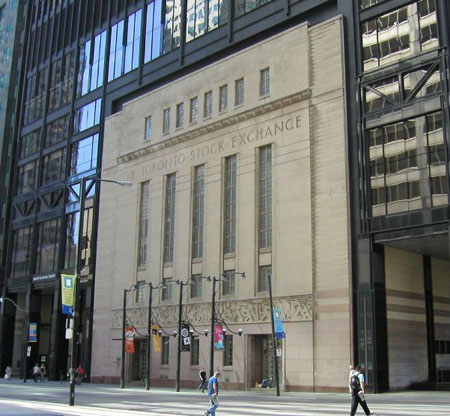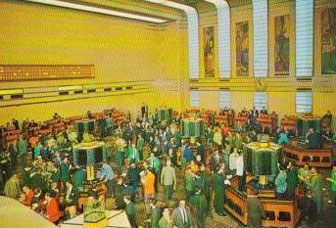Saying yes to Canada by voting no … two cheers for the death of the TMX-LSE merger deal
Jun 29th, 2011 | By Counterweights Editors | Category: In BriefShortly before 1 PM ET today it was announced that the “proposed merger of the TMX Group Inc. with the London Stock Exchange Group PLC is dead.”
As explained by the official TMX statement: “TMX Group Inc. has agreed with London Stock Exchange Group plc (LSEG) to terminate their merger agreement … A majority of shareholder votes cast by proxy prior to the June 28, 2011 proxy cutoff supported the merger resolution; however, it is clear that the two-thirds threshold required to approve the merger would not have been achieved.”
The Wall Street Journal further explains: “The merger proposal’s termination paves the way for a consortium of 13 big Canadian financial firms to try to push ahead with its own, hostile C$3.8 billion bid for the operator of Canada’s flagship Toronto Stock Exchange.” In the words of Agence France-Presse (AFP): “The move opened the way for the possible takeover of the TMX Group, which operates the Toronto and Montreal stock markets, by a consortium of Canadian banks called the Maple Group which had launched a rival $3.8 billion bid to the LSE’s.”
It is no doubt impossible not to have some concerns about the monopoly implications of the Maple Group proposal. Phrases like “13 big Canadian financial firms” and “a consortium of Canadian banks” have their own sharp edges inside Canada. As one analyst has put it: “I’m not surprised. I had thought Maple was going to get this deal done. And that their lobby was very effective…Now we need to see what the competition bureau thinks of Maple.”

Old home of the Toronto Stock Exchange on Bay Street, 1937—1983, now home to the Design Exchange, “a design museum and centre for the advancement and promotion of Canadian design.”
Or as the same analyst – Alison Crosthwait, Director of Global Trading Strategy at Instinet – explained last week, perhaps anticipating today’s final result: “I don’t think the case is made strongly enough for TMX-London – they sort of rolled over, to some degree. I would just like to see more aggression as to why this [ie the Maple Group proposal] is a really good thing – I mean, you sell me on it. Everybody has gone with this fuzzy feel-good about Canadian control – what does that mean?”
Yet when all is said and done we find ourselves nodding in agreement with Ontario finance minister Dwight Duncan: “I think this is Canadians asserting themselves … What I find particularly appealing about the circumstance here is that it was the shareholders themselves who did not accept the LSE bid. This was not rejected by government.”
* * * *
Again, some will still want to raise doubts about Mr. Duncan’s further enthusiasms: He “was one of the most vocal opponents of the proposed deal between TMX Group and the London Stock Exchange. While he was reluctant to directly intervene by blocking the proposal out of fear of sending a message to international investors that Canada is not open for business, he has emerged as a big supporter of the rival Maple bid … ‘This is a market-based solution,’ Mr. Duncan added, noting that some of the country’s largest banks, insurers and pension funds came together not by ‘government fiat’ but by ‘leading in the world on financial services.’”

Postcard of interior crowded floor of old Toronto Stock Exchange building in the 1960s. Chuckman’s Other Collection, Toronto Postcards, Volume 0.
Yet once again, we finally find ourselves coming down on the side of a parallel column by David Olive in the Toronto Star, published just before today’s announcement, and provocatively headlined “Yes to Canada by voting ‘no’.”
Mr. Olive went on (and, to repeat, just before TMX stockholders cast their ballots – or, more exactly, before the results of earlier proxy votes were officially announced just before 1 PM ET): “The rejection or approval today by shareholders of TMX Group Inc. of a takeover offer for their company will mark a turning point in Canadian history. Either we have confidence in a Canadian owned and operated financial sector, or we don’t. That’s what’s at stake today.”
He elaborated still further on what he saw as the crucial issues: “A ‘yes’ vote today delivers a mere 45 per cent of the combined entity’s stock to existing shareholders. The new enterprise would be directed from London by a foreign CEO and a board controlled by LSE appointees … The TMX has evolved into one of the world’s best-run exchanges by most measures. If one were to hitch one’s wagon to a brighter star, LSE wouldn’t be the choice. TMX outclasses LSE in 2010 net profit margin (36.8 per cent versus 23.2 per cent), return on assets (7.3 per cent to 0.2 per cent) and return on equity (25.8 per cent to 15.4 per cent).”
It is probably also worth underlining that if a simple 50% + 1 majority had been good enough, the proposed merger of the TMX Group Inc. with the London Stock Exchange Group PLC (LSEG) would have gone ahead. As made clear in a story by QMI Agency – the news gathering organization of Quebecor Media – posted as early as 12.09 PM ET today: “the LSEG only gained backing from 54% of shareholders who voted by proxy, prior to an official meeting to decide on the deal slated for Thursday. That made it virtually impossible to get the support of two-thirds of shareholders needed for the merger to go ahead.” (And to complete the picture here: “Roughly 70 per cent of shareholders voted by proxy.”)

Exchange Tower at corner of King and York Streets, new home of the TMX, 1983—present. Photo: Rod Taylor.
It may be that Alison Crosthwait, Director of Global Trading Strategy at Instinet, still has something of a point, from an altogether global village perspective: “Everybody has gone with this fuzzy feel-good about Canadian control – what does that mean?” Yet in the very end the TMX-LSE merger was just too redolent of Canada’s old colonial relationship with its old Mother Country of the United Kingdom, headquartered in the same old imperial metropolis as the London Stock Exchange. Globalization in the 21st century does not mean that the Canadian confederation of 1867 is about to altogether give up on the journey from Colony to Nation, heralded by the historian Arthur Lower, in the wake of the Second World War. Those who think that the upcoming Canadian visit of William and Catherine is somehow going to generate some sparkling new “conservative” commitment to the British monarchy in the most northern regions of North America might want to bear this in mind.


check out these blog posts: http://www.moneythinking.com/2011/…ck-market-facts/ http://www.counterweights.ca/2011/…lse-merger-deal/ http://247wallst.com/2011/03/17/wh…t-nuclear-power/ http://stockmarketplan.com/
http://www.onlinemoneymunchers.com/answers/Does-France-have-its-own-stock-market.html